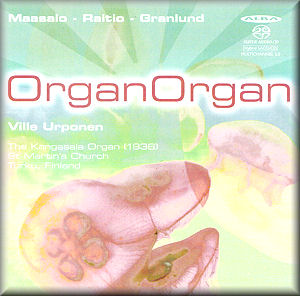 |
 |
|


alternatively
CD:
AmazonUK
AmazonUS
Sound
Samples & Downloads
|
OrganOrgan – Historical Finnish organ works
Armas MAASALO (1885-1960)
Tema con variazioni, Op. 35 (1936) [7:27]
Väinö RAITIO (1891-1945)
Canzonetta (1935) [2:32]
Armas MAASALO
Sonata in C minor, Op. 5 (1913) [16:51]
John GRANLUND (1888-1962)
Passacaglia (1915) [9:42]
Väinö RAITIO
Legenda, Op. 20 No. 1 (c. 1922-1923) [6:00]
John GRANLUND
Organ Sonata in B flat minor (1917/1920?)
 Ville Urponen (organ)
Ville Urponen (organ)
rec. 4 April, 12 September 2008, St. Martin’s Church, Turku, Finland
 ALBA RECORDS ABCD 298 [67:19]
ALBA RECORDS ABCD 298 [67:19] 
|
|
|
In my recent review
of Santeri Siimes’ CD I commented that some of the best organ
recordings now come from Finland. Regular readers will know
how taken I am with the hybrid SACDs from the Finnish label
Fuga, engineered by Mika Koivusalo. Alba, based in Tampere,
is new to me, but paging through the booklet I was delighted
to see this is a Koivusalo production as well. Curiously, Alba
don’t display the SACD logo on the front cover; do they have
so little faith in the format’s sonic virtues?
As always, it’s the music that counts, and there are no quibbles
on that score. The Finnish composers represented aren’t very
well known, but after listening to this disc I think they ought
to be. Tema con variazioni, by the organist-composer
Armas Maasalo, has an unassuming grandeur that pretty much defines
this disc as a whole. It’s an assured and characterful piece,
Urponen drawing some of the most diaphanous sounds from this
generous, sweet-toned Kangasala. As expected, the recording
is exceptionally full and vivid, with a rock-solid pedal and
pure, unfettered treble; but then I wouldn’t expect anything
less from this multi-talented tonmeister.
As for Väinö Raitio’s Canzonetta, it’s hard
to believe the composer described himself as a Modernist. Indeed,
there’s a discreet charm to this miniature that may well recall
the lighter Franck. Urponen is unerring in matters of registration
and scale, always alive to the delicate hues and textures of
this piece. Those same qualities are present in his reading
of Raitio’s Legenda, Op 20/1; in the best Sibelian tradition,
this ‘poem for great organ’ has a most imposing presence, the
recording’s deep, firm bass as thrilling as any I’ve heard on
disc. But it’s the quiet, reflective passages that are the most
telling, dynamics finely calibrated throughout.
For those weary of organ festivals, fireworks and spectaculars
this recital should come as a blessed relief. And what a pleasure
it is to be introduced to the Maasalo sonata, played with such
lightness and grace. The descending pedal figures of the Adagio
– shades of Franck’s gentle G minor Andantino – are contrasted
with ghostly scales in the organ’s upper reaches. The instrument
has a palpable, airy presence that’s just astonishing, even
in a recording with this pedigree; and those who don’t have
a Super Audio player will be pleased to know it all sounds just
as impressive in its Red Book form. The Allegretto (Pastorale)
is fleet of foot – mischievous, even – the final Fugue rather
more formal. Even here there’s an engaging simplicity to the
writing – some might call it lightweight – but such is the ease
and authority of Urponen’s playing that such criticism is easily
deflected.
As for organist-teacher John Granlund’s Passacaglia,
it opens with a restless, Tristan-like theme that yearns
for some kind of resolution. It’s a measured but naturally paced
performance that builds to a series of broad climaxes, the ur-theme
never far away. Now this really is stirring, noble stuff; in
terms of scale and presence it’s reminiscent of Sibelius, whose
œuvre for organ has been recorded by Kalevi Kiviniemi
(review).
That’s especially true of the Sonata in B flat minor; yes, there’s
a whiff of the pedagogue in this closely argued score, but there
are moments of quirkiness and – in the aerated Adagio – of unexpected
loveliness, that I enjoyed immensely. And what better way to
end than with a majestic Allegro? This is one of those understated
yet impressive pieces that really ought to be more widely programmed.
Speaking of programmes, the music here is well chosen, offering
plenty of variety and character. These are quality pieces played
– and recorded – with impeccable taste and sensitivity. Urponen
is an organist to watch, and one I’m happy to place alongside
fellow Finn Kiviniemi and the German organist Hans-Eberhard
Ross; the latter’s Franck recordings for Audite are very special
indeed.
One of the most satisfying recitals I’ve heard in ages. A mandatory
purchase for organ fanciers and discerning audiophiles alike.
Dan Morgan
|
|




 All Nimbus reviews
All Nimbus reviews








